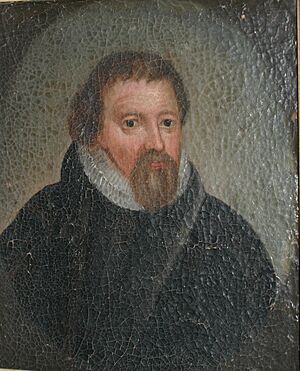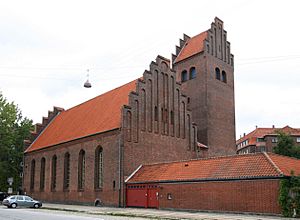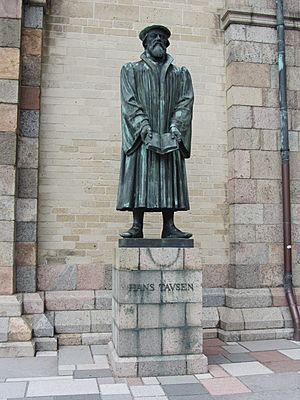Hans Tausen facts for kids
Hans Tausen (1494 – 11 November 1561) was a very important religious leader in Denmark. He is often called “The Luther of Denmark” because he played a big part in bringing the Reformation to his country. The Reformation was a time when many people wanted to change the way the Christian church worked.
Hans Tausen became a Bishop in the city of Ribe. He also did something amazing: he translated the first five books of the Bible (called the Pentateuch) into Danish in 1535. This meant more people could read the Bible in their own language.
Contents
Early Life and Education
Hans Tausen was born in a place called Birkende on the island of Funen in Denmark. We don't know much about his early childhood. He probably went to school in Odense and Slagelse. Later, he joined a group of religious brothers called friars at a monastery near Slagelse.
He studied at the University of Rostock and became a priest. He also spent some time studying at the University of Copenhagen. His religious leaders then sent him to study more in other countries, including Leuven in Belgium. There, he met scholars who loved learning about ancient texts. Hans Tausen was very good at languages, knowing both Latin and Hebrew. This helped him later when he translated parts of the Bible.
Leading the Reformation
In 1523, Hans Tausen traveled to Wittenberg, Germany, where he met Martin Luther. Luther was a key figure in the Reformation. Tausen studied with Luther for about a year and a half. When he returned to Denmark, he started sharing Luther's ideas.
In 1525, he was moved to a monastery in Viborg. There, he continued to preach about the new Lutheran beliefs. His ideas were very popular, and soon the church he was using became too small. He even preached to people in the market square!
Hans Tausen felt so strongly about his new beliefs that he left his religious order. The people of Viborg supported him. When church leaders tried to stop him, the townspeople protected him. In 1526, King Frederick I officially supported Hans Tausen. The King made Tausen one of his own chaplains and asked him to keep preaching in Viborg.
Hans Tausen also did something very new for a priest at that time: he got married! His wife was Dorothea Jensdatter Sadolin. He was the first Danish priest to marry, which was a big change from the old church rules. He also started using the Danish language in church services instead of Latin. This made the services much easier for everyone to understand.
Spreading the New Ideas
In 1529, Hans Tausen moved to Copenhagen to preach there. He faced some challenges from people who wanted to keep the old church ways. However, many people supported the new ideas.
In 1530, a big meeting of nobles was held in Copenhagen. The King and the nobles were interested in the new ideas. Hans Tausen continued to preach and encourage the changes.
After King Frederick I died, there were more disagreements. At a meeting in 1533, some people tried to have Hans Tausen removed from his church duties. But the people of Copenhagen stood up for him. Hans Tausen even helped protect a bishop who was in danger, showing his kindness. Because of this, the bishop allowed Tausen to preach in all his churches.
When the Reformation finally succeeded in Denmark, Hans Tausen was made the Bishop of Ribe in 1542. He served as bishop for twenty years, helping to guide the new church in Denmark.
Memorials
- A church named Hans Tausen's Church was opened in Copenhagen on November 30, 1924.
- In 2004, a modern monument was built in Viborg to remember Hans Tausen. This was to celebrate 475 years since the Reformation began in that town. The monument was created by a Danish artist named Bjørn Nørgaard.
See also
 In Spanish: Hans Tausen para niños
In Spanish: Hans Tausen para niños
 | Leon Lynch |
 | Milton P. Webster |
 | Ferdinand Smith |




